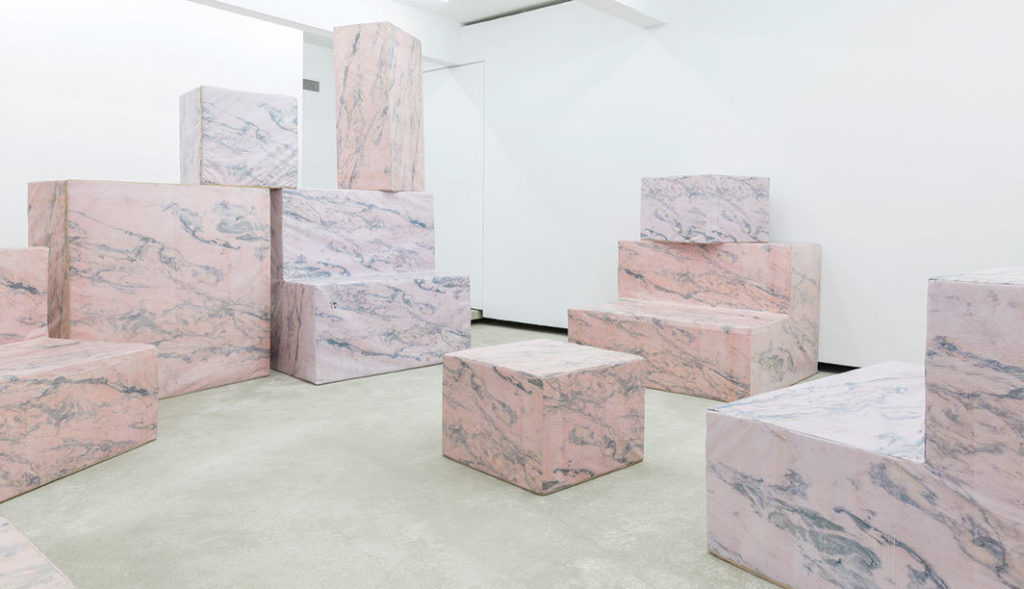Andreas Angelidakis
A Submissive Acknowledgement of Powerlessness - Review
September 1, 2019–September 30, 2019Artforum
We are pleased to share the review of Andreas Angelidakis exhibition “A Submissive Acknowledgement of Powerlessness” at The Breeder, on the September issue of Artforum, written by Klea Charitou.
Andreas Angelidakis
THE BREEDER
They say that you can understand a city’s economic status by examining its building activity. After a decade of crisis, dumpsters, with their characteristic yellow marks signifying construction, have recently begun to reappear on the streets of Athens. Has the city finally crawled, exhausted, to the other side?
Andreas Angelidakis, who trained as an architect even if he never practiced that profession, has always been a sensitive observer of the money-spinning and psychosocial layers of the city. In his recent exhibition “A Submissive Acknowledgment of Powerlessness,” Simple Tricks to Look Better in a Photo, 2019, set the show’s sarcastic tone, greeting visitors with a yellow screen that bore the work’s listicle-like title. Beside it was Report from Athens, 2017, a mixed-media light box featuring a collage of old newspaper advertisements and street flyers that chronicle the 1950s hope for a better housing future. But the history of postwar Athens was destined to be shaped by forces beyond the control of architects, namely the influx of refugees fleeing armed conflicts an ever-present corruption, and the psychological legacy of Ottoman rule. It was in the Greek capital, too, that people invented the principle of anteparohi: the shady reciprocal exchange between landowner and construction company, whereby each new apartment block is divided for mutual profit maximization and tax avoidance. In Distyle Airbnb, 2019, two yellow columns paid mock homage to the city’s malaise in the form of an unfinished contemporary Doric temple built from the chained cylindrical chutes that Airbnb renovators now use to discard their debris from the scaffold to the street below. For Angelidakis, yellow is clearly a color ripe with contradictory connotations: representative not only of hope and sunshine but also of cowardice and disease. Such antinomies continued in Architecture Is Doomed to Complicity with Systems of Greed, 2019, a suite of curious, 3-D-printed sculptures that depict fantastical, Tower of Babel-like structures; the designs have been reprogrammed with elements chaotically twisted and reminiscent of a financial system in dystopic collapse. Patently they mock the “starchitectural” schemes of the latest global wunderkinder, whose discipline has become a reflection of glittering grandiosity and a testimony to an inegalitarian age.
In the basement, DEMOS Pink, 2018, offered visitors the chance to create their own contemporary ruin. Here, soft foam blocks served as infinitely reconfigurable modular seating for a gathering. The form represents, perhaps, a queer alternative to a culture of excess, a more inclusive counterpoint to the marble steps of the Pnyx in ancient Athens. First devised for Documenta 14, Angelidakis’s “Demos” series, 2016–, has quickly evolved into his signature body of work, the blocks’ surfaces altered for each iteration: faux pink marble for the Moscow Museum of Modern Art; ancient and folkloric designs from handmade rugs for the Museum of Contemporary Art in Toronto; political slogans for the KODE Art Museums and Composer Homes in Bergen, Norway. In Angelidakis’s neo-animist worldview, buildings represent emotional forms that reflect reality in the most brutal way—a landscape one recognizes in the streets surrounding the gallery, where the textual chaos of graffiti has transformed a sea of architectural mediocrity into a collective howl of existential anguish.
Upstairs, in Diogenes, 2019, a queer Diogenes had abandoned his clay wine jar to sit on a rotating base resembling a dance floor with strobe lights. One imagined this figure—Angelidakis’s sculptural alter ego—spitting out the phrases we saw imprinted on the sculptures all around: IGNORING IDEOLOGICAL CONTRADICTIONS, INNOVATIVE BANKING PRODUCTS, STOCK NARRATIVE. The original Diogenes, lest we forget, was a banker’s son exiled to Athens, where he joined the school of the cynics. He gave away his possessions to adopt a tattered cloak and wander through the city with a lamp in daylight. Asked what he was doing, he would reply, “I’m searching for an honest man.” Nowadays, Angelidakis describes him as a prototype for the internet troll. But the artist betrays a certain wisdom behind his cynical facade. Even as we speak, certain architects are adopting new versions of anteparohi, only the consequence for their discipline remains forever uneasy, their designs inevitably compromised by the exigencies of avarice. Of course, a similar principle also applies to contemporary art—a parting realization that Angelidakis is either too gracious or too cunning to offer.
— Klea Charitou
